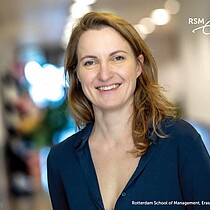

Article: Thursday, 1 August 2024
Nudges are used in lots of ways in the public sector; they are the application of behavioural science to influence – in a predictable way – the choices that people make. A nudge changes the presentation of choices so people are more likely to pick the option that benefits them. But their effectiveness varies according to their setting. Some of the reasons why nudges don’t work the same on everyone have been explained by Assistant Professor Antonia Krefeld-Schwalb from Rotterdam School of Management, Erasmus University (RSM) and co-researchers Eli Rosen Sugerman and Prof. Eric J. Johnson of Columbia Business School in their paper Exposing omitted moderators: Explaining why effect sizes differ in the social sciences, published in the Proceedings of the National Academy of Science of the United States of America.
Policymakers increasingly rely on behavioural science to influence responses to global challenges such as climate change or health crises. But their interventions often exert very different effects according to who they’re used on and where they are encountered – and this has become an important problem. The use of behavioural science has been under Increasing scrutiny and criticism recently because of failed replications and high-level fraud cases in the field. Dr Krefeld-Schwalb’s large-scale study aimed to embrace and explain the differences in nudges’ effects caused by differences in people and their situations.
The researchers used online data collection to study the responses of 11,000 people to an assortment of nudges that are used for many behavioural interventions, and they found substantial divergences across settings and examples.
They applied techniques for modelling the divergences, and introduced a framework that measured the often-overlooked moderating factors that can affect the nudge either in intensity or direction. When they did this, their framework allowed them to measure the effects of what they called ‘fluid intelligence’ and ‘crystallized intelligence’ alongside attentiveness and experience for nudges and interventions that were presented as texts. They noted the different sizes of the effects and were able to identify which moderating factors were responsible for the variations. They were also able to measure and describe some people’s cognitive variables.
People are more different than behavioural scientists might think.
A particular intervention can work strongly on some people, but weakly on others. Some interventions have the opposite effect on different individuals.
“We found very large differences in the strengths of the effects on people’s behaviour. Some of those differences can be explained by the cognitive variables we measured. For example, we observed that more intelligent people are more strongly affected by framing a choice as a loss or win,” said Dr Krefeld-Schwalb.
The researchers were then able to give a theoretical and empirical framework for understanding and predicting how moderating factors produce variances in the size of the nudge’s effect.
The researchers’ findings can enable governments and businesses to choose the right interventions for a particular segment of society. When the cognitive variables of a target audience are understood, then nudging strategies can be developed that promote a particular choice. In policy making, behavioural science is becoming increasingly used, for example to increase sustainable or health-promoting behaviour.
And while there are clear business and society benefits to nudging, there are still considerations to be taken into account:

You can read the full paper Exposing omitted moderators: Explaining why effect sizes differ in the social sciences in the Proceedings of the National Academy of Sciences.


Science Communication and Media Officer
Rotterdam School of Management, Erasmus University (RSM) is one of Europe’s top-ranked business schools. RSM provides ground-breaking research and education furthering excellence in all aspects of management and is based in the international port city of Rotterdam – a vital nexus of business, logistics and trade. RSM’s primary focus is on developing business leaders with international careers who can become a force for positive change by carrying their innovative mindset into a sustainable future. Our first-class range of bachelor, master, MBA, PhD and executive programmes encourage them to become to become critical, creative, caring and collaborative thinkers and doers.
